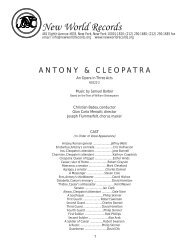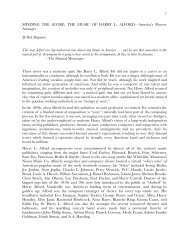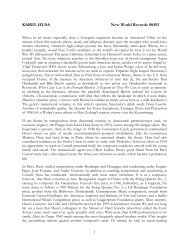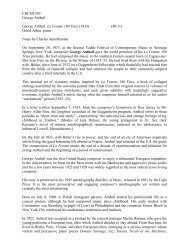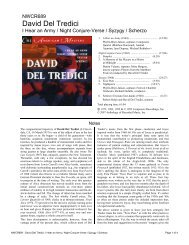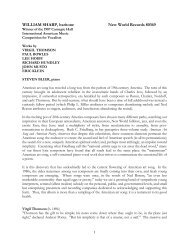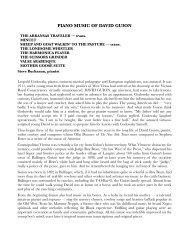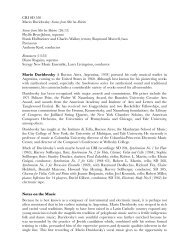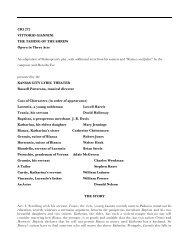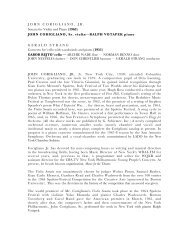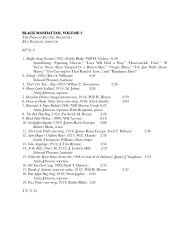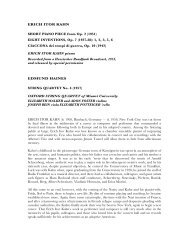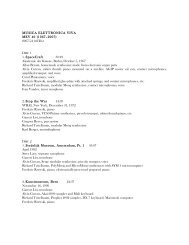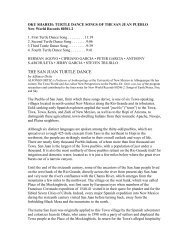Brother, Can You Spare a Dime? - New World Records
Brother, Can You Spare a Dime? - New World Records
Brother, Can You Spare a Dime? - New World Records
You also want an ePaper? Increase the reach of your titles
YUMPU automatically turns print PDFs into web optimized ePapers that Google loves.
William Lee Conley (“Big Bill”) Broonzy (1893–1959) was one of seventeen children<br />
born to a sharecropping couple in Scott, Mississippi. “When you work twelve months of<br />
the year as a farmer and don’t come out of debt, and the boss has to give you food on<br />
credit ’til the crop is sold, you can’t do nothing but get the blues,” he writes of his early<br />
days in his autobiography, Big Bill’s Blues. Like so many blacks of the time, he made his<br />
way north to Chicago, where he recorded his first disc, “House Rent Stomp,” in 1927 for<br />
Paramount <strong>Records</strong>. Before his career ended shortly before his death, he made hundreds<br />
of records: alone, with other singers (Bill Williams, Hannah May, Charlie Jackson), and<br />
as a member of such groups as the Chicago Black Swans, the Famous Hokum Boys, and<br />
the Midnight Ramblers. The titles of many of his songs read like a catalogue of the<br />
troubles of blacks during the thirties: “Police Station Blues,” “Bad Luck Blues,” “Mean<br />
Old <strong>World</strong>,” “Hungry Man Blues,” “I’m Just a Bum,” “<strong>You</strong> <strong>Can</strong>’t Win” “Friendless<br />
Blues,” “Hobo Blues,” “Starvation Blues,” “WPA Blues,” “When I Had Money.” His<br />
early recorded country blues are characterized by a powerful singing voice and brilliant<br />
and expressive guitar work. Broonzy later enjoyed considerable fame in the white world.<br />
John Hammond brought him to <strong>New</strong> York for the historic “Spirituals to Swing” concert<br />
in Carnegie Hall in the late thirties; he played and recorded with Pete Seeger and friends<br />
late in his life; and with the help of the French jazz critic Hugues Panassie he toured<br />
Europe in 1951. Broonzy influenced such European singers as Lonnie Donnegan, one of<br />
the most popular British stars in the early days of rock ’n’ roll.<br />
The Gold Diggers’ Song (We’re in the Money)<br />
(Al Dubin and Harry Warren)<br />
(From the film Gold Diggers of 1933)<br />
Dick Powell, with studio orchestra. Recorded May 25, 1933, in <strong>New</strong> York. Originally<br />
issued on Perfect 12919.<br />
Warner <strong>Brother</strong>s brought out three musicals in 1933, all among the top money-makers of<br />
that year: Gold Diggers of 1933, Forty-second Street, and Footlight Parade. All had<br />
lavish sets, production numbers by Busby Berkeley, songs by Harry Warren and Al<br />
Dubin, and top stars from the studio’s stable, including Ginger Rogers, Dick Powell,<br />
Ruby Keeler, Joan Blondell, Guy Kibbee, and Ned Sparks. All were topical in that they<br />
were set in modern, Depression-ridden America. But it was a make-believe America in<br />
which problems were nothing more than minor annoyances along the path to the<br />
inevitable happy ending.



